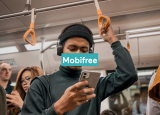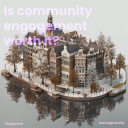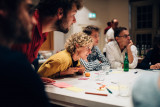Stay in the know on all smart updates of your favorite topics.
🚀 Oproep voor organisaties in de publieke sector! Draag bij aan de ontwikkeling van ethische mobiele innovatie! 🌍

Wil jij de status quo uitdagen en bijdragen aan een mobiel ecosysteem dat privacy, duurzaamheid en ethische technologie vooropstelt?
💡 Bij Waag Futurelab zijn we vastbesloten om alternatieven te verkennen voor de datahongerige apps en apparaten die momenteel de techwereld domineren. Via ons onderzoeksproject Mobifree nodigen we organisaties in de publieke sector uit om een open-source Murena-smartphone te testen en samen met ons de toekomst van ethische, open-source mobiele technologie in Europa vorm te geven.
Dit is jouw kans om:
✅ Als organisatie Murena-smartphones te testen, voorzien van open-source apps.
✅ Feedback te geven die direct invloed heeft op de volgende generatie mobiele oplossingen.
✅ Bij te dragen aan een duurzaam, veilig en inclusief alternatief voor Big Tech.
🔍 Wat kun je verwachten?
- Doe mee aan een pilot van twee maanden (februari–oktober 2025) en verken hoe open-source tools jouw werk- en persoonlijke behoeften kunnen ondersteunen.
- Test baanbrekende technologie terwijl je pleit voor ethische en duurzame softwareontwikkeling.
- Maakt deel uit van een community die een privacy gerichte en Big Tech-vrije toekomst vormgeeft!
🙌 Wie kan deelnemen?
We een groep van maximaal 30 deelnemers om de volgende kerngebieden te verkennen:
- Besturingssystemen
- Messaging-apps
- Appstores
- Cloudservices
📩 Hoe kun je je aanmelden?
Stuur een e-mail naar bente[at]waag[dot]org met de naam van je organisatie, het aantal deelnemers, gekozen categorieën en een korte motivatie om mee te doen. Vervolgens zullen wij contact met je opnemen!
Doe met ons mee om mobiele technologie opnieuw vorm te geven voor een betere, privacy-respecterende Europa 🌟
Research Interviews Request for PhD Dissertation!
My name is Pınar Ebe-Güzgü, a PhD student at İzmir Katip Çelebi University, Turkey, currently conducting research at the University of Twente. My doctoral research focuses on social justice and disadvantaged groups in the context of smart city applications, with a particular emphasis on the mobility of elderly people (defined by WHO as people over the age of 65).
As part of my research, I conduct in-depth interviews with residents (aged 65+) of Amsterdam, caretakers of elderly individuals, and those working on (or with expertise in) smart city initiatives. The goal is to explore the mobility experiences of 65+ people in Amsterdam and develop policy recommendations to enhance social justice in urban management.
If you would like to share your experiences, your participation in this research would be invaluable. All interviews will be conducted at a time and format that suits you.
Thank you for your time and consideration. Your insights will greatly contribute to our understanding of how smart city applications impact the mobility and quality of life of older individuals.
If you are interested in participating, please reach out to me via the email address below:
p.ebe-guzgu@utwente.nl
Best regards,
Pınar Ebe-Güzgü
Is community engagement worth it? 1 Minute Help

Hallo allemaal, Fijne woensdag, 😀 (English below)
Wij willen graag begrijpen en leren oof participatie in de gebouwde omgeving de moeite waard is en welke uitdagingen je daarbij bent tegengekomen.
Vul deze enquête van 30 seconden (max. 1 minuut) in en kijk wat andere professionals ervaren.
Cheers,
Playground Team
----------------
Hello all, Happy Wednesday, 😀
We would like to understand and learn if participation in the built environment is worth it and what challenges you have experienced with it.
Please complete this 30-second (max 1 minute) survey and see what other professionals experience.
Cheers,
Playground Team
www.plgrnd.city
WANTED: Cross-Sectoral Collaborations in Rural Areas across Europe

Hello,
with our german initiative <em>KreativLandTransfer</em>, we are currently looking for cross-sectoral collaborations between cultural and creative industries and small and medium-sized enterprises in rural regions <strong>across Europe</strong>. As a first step, we are looking for suitable collaborations throughout Germany as well as in other European countries in order to present them on our website.
We have published an online form that can be filled out by the representatives of such a collaboration. Our aim is to highlight the success factors and enable a European knowledge exchange. With selected collaborations we also want to conduct in-depth interviews for which they will be compensated financially and have film portraits made.
You are part of such a collaboration? Then, you are more than welcome to fill out our online form. You know of other collaborations that would fit our criteria? Then, it would be great if you could send us the relevant information and we will contact them personally.
More details about the project and our plans can be found here:
Website KreativLandTransfer
Link to the online form
If you have any questions, please do not hesitate to contact us.
With kind regards
Katrin Kappenberger
Project Manager
Denk mee over de toekomst van AI

Kunstmatige intelligentie rukt op. Studenten kunnen een werkstuk laten schrijven door ChatGPT. Siri beantwoordt je vragen in een handomdraai, maar luistert stiekem ook met gesprekken mee. Intelligente robots kunnen een oplossing zijn voor het tekort aan personeel in de zorg of in de glastuinbouw. De komende jaren wordt veel wetenschappelijk onderzoek gedaan naar kunstmatige intelligentie. We vragen je daarom mee te denken over waar dat onderzoek over moet gaan.
Welke thema’s zou jij wetenschappers willen meegeven? Wat is jouw toekomstvisie over kunstmatige intelligentie? En welke onderzoeksrichtingen moeten onderzoekers volgens jou juist vermijden? Vul de enquête in
De uitkomsten van deze enquête dienen als input voor de Nationale Wetenschapsagenda. Deze agenda bepaalt de richting waar het wetenschappelijk onderzoek in Nederland over gaat.
OK Google: Give me my data. Explore and (maybe) donate your voice records towards more inclusive voice recognition technology!

If you are a user of voice assistants, you have probably experienced misunderstandings, especially if you are a woman or have an accent. One of the reasons behind misunderstandings is bias in voice biometrics. This is not a problem if you’re a white US male, but for the rest of us, voice-based systems may be biased.
If you use Google Assistant, whether you use the Assistant App, use Google Home, or Google Nest, you can help mitigate bias in voice biometrics by donating your voice records.
In the process, you will be able to explore your data before committing to donate it.
To do so:
- Download a copy of your Google Assistant records (See detailed instructions)
- Upload your data to our Data Donation Platform and explore it
- Decide what exactly you want to share and donate your data!
We will use the donated data to develop design guidelines and construct an evaluation dataset that reflects real-life usage conditions of voice biometrics technology. In addition, you can participate in a follow-up interview to delve into your personal experience with voice assistants and further explore your data.
This project is part of my PhD research and your contribution would be greatly appreciated! Feel free to reach out :)
HELP ME GRADUATE! Resident's self-efficacy for the creation of social cohesion in Amsterdam
Dear community,
To finish my studies at Hotelschool The Hague, I am conducting a research project. My research examines how the level of self-efficacy of residents in intensively visited cities can influence the creation of social cohesion. Over the years, the city of Amsterdam has become flooded with tourists and will therefore be the main focus of this research.
Are you, or have you been, a resident of Amsterdam? Then please do take five minutes out of your day to share your experiences with me. It would mean a lot!
In case of any questions or remarks, do not hesitate to contact me at 781008@hotelschool.nl.
Sharing is much appreciated and thank you very much in advance!
Link to the survey: https://lnkd.in/gtDReWrX
Warm regards,
Manon Gravesteijn
Crowd Monitoring Summer Survey (1 min.)

For those of you who know, Marineterrein Amsterdam has been a test area to explore responsible counting of crowds (big and small) in a living lab environment. Summer temperatures are bringing large numbers people to the Marineterrein to cool off - but earlier this winter / spring, the crowd monitor revealed some fun facts about how people made use the inner-city living lab during the Covid19 lockdown.
This summer we’re collecting feedback from the Marineterrein community and the general public. Have you ever been to the Marineterrein? If so, how do you feel about counting people in public space? In this 1 minute survey we ask 5 simple yes/no questions to help us improve your experience on the smart city campus.
Your help is appreciated!
Enquête (1min): Internationaliseren als MKB tijdens en na een crisis
Veel MKB-ers willen zich uit de crisis innoveren. Internationaal actief worden is kansrijk en vraagt voorbereiding en energie. Amsterdam Trade and Innovate en PIM Noord-Holland (Programma Investeringsgereed Innovatief MKB Noord-Holland) willen ondernemers helpen dit goed en succesvol aan te pakken. Ben jij een MKB-er in de MRA die actief is op de thema's van smartcity? Vul dan de enquête in zodat ons aanbod goed aansluit bij wat jij nodig hebt. Hou onze media in de gaten, in q1 organiseren we onze eerste event gericht op internationalisering.
Call for Cities to test the Responsible Sensing Toolkit

As societal values change and the deployment of sensing technology becomes more ubiquitous, what are our digital rights in a 21st-century city? This dilemma is forcing municipalities to make difficult decisions about practice versus the policy of collecting data from public space. In collaboration with the City of Amsterdam, The City Innovation Exchange Lab (CITIXL) has created the Responsible Sensing Toolkit - a six-step process to help navigate this new landscape in a fast and effective way. The toolkit was co-designed by experienced city innovators to empower municipalities, organisations, and communities to implement open and inclusive sensing solutions for our 21st-century cities.
We are currently seeking cities to test the step-by-step process to guide the design and implementation of crowd sensing pilots in public spaces. For complete details about the Toolkit and how your city can participate please visit http://www.citixl.com/responsible_sensing_toolkit/ or contact CITIXL co-founder Paul Manwaring at paul@citixl.com
Knowledge Quest: Submit Your Example of a Great High Density Environment

Do you know a great example of high density living environments built within the last 30 years? Share your knowledge and contribute to the creation of an open repository via Crowd Creation. To be truly exemplary, the area should include a mixture of functions (at least some of them high-rise) where the physical fabric retains a human scale at street level despite the high density.
You may wonder who's asking for and compiling this information: the Chair of Spatial Urban Transformation at the Amsterdam University of Applied Sciences is committed to building an open-access repository. Sharing best practices across the globe is becoming increasingly vital, especially as many of our western cities are on the eve of unprecedented densification. As a humble thank you for helping to guide this societal challenge, they've allotted 12 rewards for contributors. Click here to submit a project.
Societal Context
Like many of our Western cities, Amsterdam is on the brink of intensive urban densification. The metropolitan area of Amsterdam plans to add 100,000 new dwellings, mostly within the existing urban fabric. Compact studio apartments and new situational typologies of high-rises are part of the program, which will increase the densification even further. How are we to retain a human scale in these new high-density environments, especially at the street level where our social fabric is shaped? This calls for a new array of examples and precedent studies of successful existing "Great High Density Environments." What are their design properties and how are they programmed? How do they succeed in retaining a human scale?
 Amsterdam - Image Courtesy of Amsterdam University of Applied Sciences
Amsterdam - Image Courtesy of Amsterdam University of Applied Sciences
Sensing Streetscapes Project
These questions are central to the Sensing Streetscapes Project initiated by the Chair of Spatial Urban Transformation at the Amsterdam University of Applied Sciences (AUAS). In a consortium of spatial design offices and clients of large scale projects, action research is explored along three lines. First, building on the classic works of Allan Jacobs, Jan Gehl and the like, six of the most-used reference locations for these new environments are deconstructed by research through design. Second, neuro-architectural technologies (eye-trackers) are deployed to uncover the visual impact of the applied design principles: What are the patterns? Do these design solutions indeed mitigate the high density and intensity to a human scale on the level of the streetscape? Finally, an algorithm is developed to trace the most suitable best practices via AI. That’s where you come in.
 Cassilis Road, London - Image Courtesy of Amsterdam University of Applied Sciences
Cassilis Road, London - Image Courtesy of Amsterdam University of Applied Sciences
Repository of Great Examples by Crowd Creation
Some high profile examples of great high density environments are well known, like in Vancouver, Toronto, London, Manchester, Amsterdam, Hamburg, and Manhattan. Yet what lesser-known examples of Great High Density Living Environments are out there for us to learn from? Share your knowledge and contribute to the creation of an open repository via Crowd Creation.
In order to frame the search, a list of desired characteristics:
- Residential environment in an inner city area
- Built within the last 30 years – or about to be 'opened' soon
- Built for High Density with some high-rise buildings
- Success in creating a human scale at eye-level on the street
- Some level of mixed functions, green design, etc. - anything that increases the livability of the environment
Click here to submit a project.
 Hardman Street, Manchester - Image Courtesy of Amsterdam University of Applied Sciences
Hardman Street, Manchester - Image Courtesy of Amsterdam University of Applied Sciences
You are, of course, allowed to offer one of your own projects as an example. The deadline for submissions is January 29th, 2021 and as a modest gesture of thanks for helping address this societal challenge, 12 rewards are available to contributors. Out of the projects that fit the characteristics, consortium members will select the contributors who delivered either multiple great examples, surprisingly interesting examples, or in-depth descriptions and pictures. 12 entrants will be randomly selected to be rewarded:
- 2 will receive personalized book selections on this topic (favorites of the Chair)
- 6 will receive an Amazon gift card with a value of €50
- 4 will receive a ticket to the Media Architecture Biennale 2021
- Winners will be notified personally
Visit the results at https://sensingstreetscapes.com. The website will remain open afterwards, so feel free to keep sending your examples!
Digital Twins
Interested in implementation of data privacy in digital twins. Contact me for projects in health & citizen data.
Stay up to date
Get notified about new updates, opportunities or events that match your interests.

